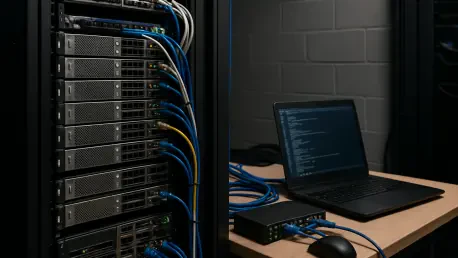Setting the Stage for a Shifting Market
In 2025, the Managed Service Provider (MSP) sector stands at a critical juncture, with service desks—once the bedrock of IT support—facing unprecedented scrutiny. Imagine a business client, accustomed to the instant resolutions of consumer apps, growing frustrated with a lengthy support call to resolve a critical IT issue, highlighting the mounting pressure on MSPs to redefine their service delivery models. This scenario encapsulates the challenges ahead. With customer expectations shaped by seamless B2C interactions and technologies like Artificial Intelligence (AI) reshaping operational capabilities, the market is buzzing with debate: has the traditional service desk model become a relic? This market analysis delves into the forces driving transformation, examines current trends, and projects the future trajectory of MSP service desks, offering strategic insights for stakeholders aiming to stay competitive in a rapidly evolving B2B technology landscape.
Deep Dive into Market Dynamics and Projections
Consumer Expectations Redefining B2B Support Standards
The MSP market is witnessing a seismic shift as B2B clients increasingly demand service experiences mirroring the efficiency of B2C platforms. Businesses now expect near-instantaneous resolutions and real-time updates, inspired by the ease of consumer services like online shopping or ride-sharing apps. A recent industry survey indicates that over 70% of B2B customers prioritize low-friction interactions, pushing MSPs to overhaul their traditional, reactive support structures. While hyperscalers dominate with self-service portals that reduce human intervention, many MSPs see an opportunity to stand out by maintaining a personalized touch. This tension between automation and human interaction is shaping market strategies, as providers grapple with delivering efficiency without sacrificing the trust built through direct engagement.
AI Integration: A Catalyst for Operational Efficiency
Artificial Intelligence has emerged as a transformative force within the MSP service desk arena, acting as a powerful tool to enhance rather than replace human operators. Platforms equipped with AI-driven features—such as predictive analytics, sentiment tracking, and automated solution suggestions—are enabling faster issue resolution, with some providers reporting efficiency gains of up to 30%. However, the effectiveness of these tools depends heavily on robust data infrastructure, including comprehensive knowledge bases, which many MSPs struggle to maintain due to a focus on short-term problem-solving. As AI adoption grows, market projections suggest a significant uptick in Service Level Agreement (SLA) compliance, positioning early adopters to gain a competitive edge over slower-moving counterparts.
Organizational Challenges Stifling Technological Progress
Beyond technology, the MSP market faces substantial internal barriers that hinder the full realization of service desk transformation. Mid-sized providers, often with revenues ranging from $50 million to $300 million, frequently lack the resources to implement advanced systems or establish dedicated innovation hubs, unlike their larger competitors. Resistance to change among staff, compounded by inadequate training, further slows adoption rates, with many operators viewing AI as a threat rather than an ally. Market analysis reveals that overcoming these hurdles requires a cultural shift, emphasizing clear communication and upskilling initiatives to align teams with evolving operational goals, ensuring that technological investments yield tangible returns.
Emerging Trends Shaping the Future of Service Desks
Looking at current market patterns, hybrid service models that blend self-service capabilities with human support are gaining traction among leading MSPs. Advanced analytics are also playing a larger role, with tools now able to anticipate issues before they escalate, tailoring support to specific client contracts. Economic pressures and stricter data privacy regulations are influencing how AI handles sensitive information, adding complexity to implementation strategies. Industry forecasts predict that from 2025 to 2027, the majority of MSPs will integrate AI-assisted systems, but success will hinge on balancing innovation with organizational readiness, ensuring that efficiency does not come at the expense of customer satisfaction.
Competitive Differentiation Through Strategic Adaptation
In a crowded market, the ability to adapt service desk operations serves as a key differentiator for MSPs. Those who invest in AI to empower their teams, rather than reduce headcount, are likely to build stronger client relationships, particularly when contrasted with the impersonal self-service models of hyperscalers. Data suggests that personalized support remains a valued asset, especially for complex IT challenges where human expertise is irreplaceable. As competition intensifies, MSPs that prioritize both technological upgrades and staff development are projected to capture greater market share, setting a new standard for service delivery in the B2B tech space.
Reflecting on the Path Forward
Looking back, the market analysis conducted revealed that the traditional MSP service desk is not obsolete in 2025 but has undergone significant evolution driven by consumer-inspired expectations, AI advancements, and organizational challenges. The findings underscored that while technology reshapes operational efficiency, the human element remains a vital component of client trust and loyalty. For MSPs, the next steps involve actionable strategies such as investing in robust knowledge bases to support AI tools and restructuring roles to focus on long-term process improvements. Additionally, fostering a culture of continuous learning through targeted training programs emerges as essential to ease transitions and maintain competitiveness. As the market continues to evolve, stakeholders who prioritize a balanced approach—leveraging innovation while preserving personalized support—position themselves to thrive in an increasingly demanding landscape.









